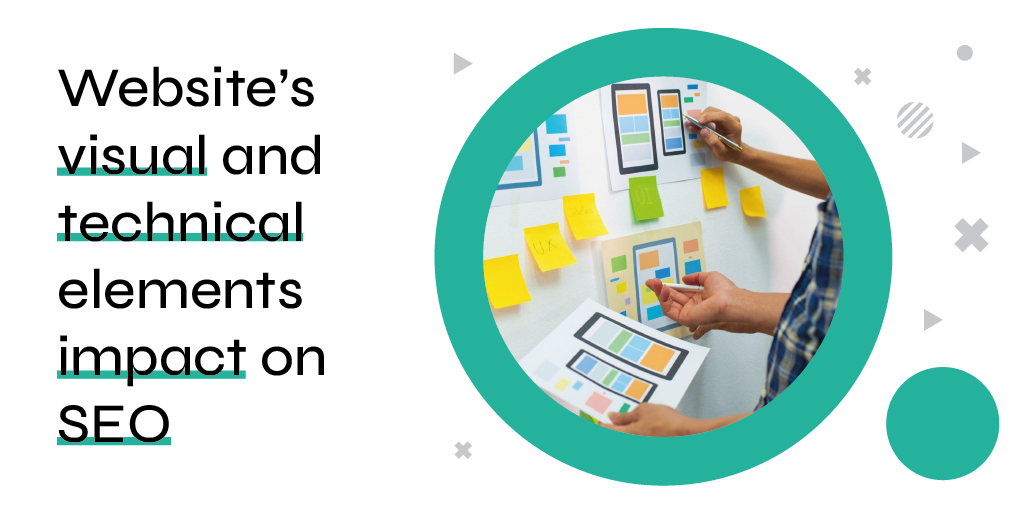Previously, SEO was much simpler than it is now. In most cases, keywords were responsible for generating results. We should first examine why web design affects SEO rankings. As the internet grew in popularity, search engines evolved to be more user-oriented, crawling websites that answered users’ questions, fulfilled their needs, and improved their web browsing experience.
Search engines are no longer concerned with simply ranking websites; they are more concerned with providing users with what they desire in the shortest amount of time, with the fewer number of clicks, and in the most comprehensive manner. As most of these factors relate to web design and development, as such it is an extremely significant factor that affects SEO rankings.
Now let’s talk about whether web design affects SEO rankings. The answer to this question can be found by looking at factors on a website design that contribute to Google’s ranking signals.
A poor website structure affects ranking score
A site is likely to be the first point of contact between your company and a potential client. Therefore, you must ensure it is designed to provide them with a positive experience. It is also key to maintaining a strong presence in search engines.
Google considers the click-through rate, time spent on the site, and bounce rate when making its ranking decisions. If users spend little time on your site or avoid it altogether, Google will deem this a poor user experience and will rank it lower.
Users are more likely to enjoy a positive experience if the navigation structure is clear, intuitive, and easy to navigate. In addition, the content is easily read in a suitable font and size, and is broken up with images, infographics, or videos rather than one long panel of text.
Whenever a user experiences a poor experience on your website or is unable to accomplish a goal they came to for, this signals to Google. This is because the page is unable to deliver the desired results for the keywords you appear in the search engine results for. As a result, this can lead to the page being ranked lower by Google.
A website’s loading time affects its search engine ranking
SEO performance is directly impacted by the speed at which your website’s pages load.
As Google’s primary objective is to provide web users with a seamless experience, if a page takes too long to load, then the user will likely be unhappy with the result.
It has been Google’s policy to use page speed as an influential ranking factor since 2010. In 2018, it was announced that it would be applied to mobile searches as well.
For the purpose of calculating page speed, Google uses several metrics, including FCP and FIP, and compares those measurements against real-world data.
It is likely that websites with large amounts of JavaScript or large images will affect the loading speed of the website significantly.
A slow website is also more likely to result in users leaving before they discover what they are looking for or make a purchase – they are also less likely to return to that website in the future due to the lack of a positive user experience.
Mobile-friendliness in web design affects SEO
Around 52% of website traffic now originates from mobile phones, as almost everyone owns one. The mobile-friendly design of the website allows users to browse the website on their mobile devices without having to use a laptop or desktop device. Mobile-friendly websites usually outrank websites that are not, so it is definitely worthwhile to ensure that your website looks great and functions as designed on any device as possible.
For better rankings, pay attention to these three factors
The topic of search engine optimisation is complex. However, there are a few areas that can be improved that will have a significant impact on your ranking position. This is how SEO contributes to the success of your website by increasing the quality and quantity of website traffic and leads.
Ensure that your content is of high quality
As part of Google’s algorithm change, it is more important than ever that you provide your audience with relevant and useful content. If your content is highly relevant to what people are searching for, you will be on your way to achieving profitable SEO results.
Obtain quality links from relevant authority websites
Whenever search engines see authoritative, high-ranking sites linking to your content, they recognise you as a reputable authority on the subject, increasing your credibility and the quality of your keyword rankings.
Enhance the user experience on the website
In addition, if your website is fast, easy to navigate, and easy to read on any device, it will also help your search engine rankings.
In summary
There are many ways in which web design impacts SEO, including page speed, mobile friendliness, and user experience. It may seem that search engine optimisation is more user-centric, but having a website benefits businesses in several ways, including access to a broader audience and the ability to generate leads. In order to improve your website’s ranking, you can focus on 3 core aspects of SEO, which are high quality content, obtaining quality links, and improving user experience. If you are looking for a web design company in Johannesburg, contact us about your website.






